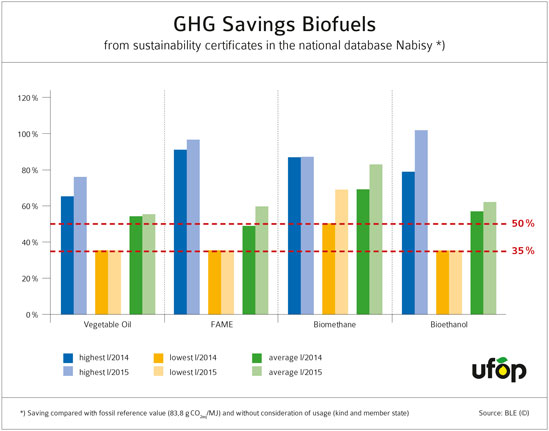Biofuel advantage – on average 60 percent better than fossil fuels
UFOP sees expectations confirmed: The obligation to reduce greenhouse gases is driving competition

Berlin, 29th June 2015 – With an average greenhouse gas reduction of 60 percent, the competition for the highest greenhouse gas efficiency is starting. This was confirmed in the first quarterly report by the Federal Office for Food and Agriculture (BLE). The calculation is based on the sustainability certificates entered into the "Nabisy" database.
On 1st January 2015, Germany became the first EU member state to introduce the obligation to reduce greenhouse gases, starting with a quota of 3.5 percent by 2016, 4 percent from 2017 and 6 percent by 2020. The information provided by the BLE confirms the expectations held by the Union for the Promotion of Oil and Protein Plants (UFOP) that the legal requirements from the Renewable Energy Directive, which stipulates a greenhouse gas reduction of 35 percent currently and 50 percent from 2017 as a condition for market access, would be greatly exceeded.
On average, the greenhouse gas saving is already more than 60 percent. This results in a reduction in the biofuels and therefore also biomass raw materials required to meet the obligation to reduce greenhouse gases. This is an efficiency gain in two senses, which is only present in this form for biofuels. Biofuels made from oil seed or grain in particular must face new competitive conditions as well as extensive certification requirements. UFOP emphasises that this is an outstanding unique feature in the bioeconomy sector compared with the material use of renewable raw materials.
Please download press graph here.


 Union zur Förderung von Oel- und Proteinpflanzen E.V.
Union zur Förderung von Oel- und Proteinpflanzen E.V.